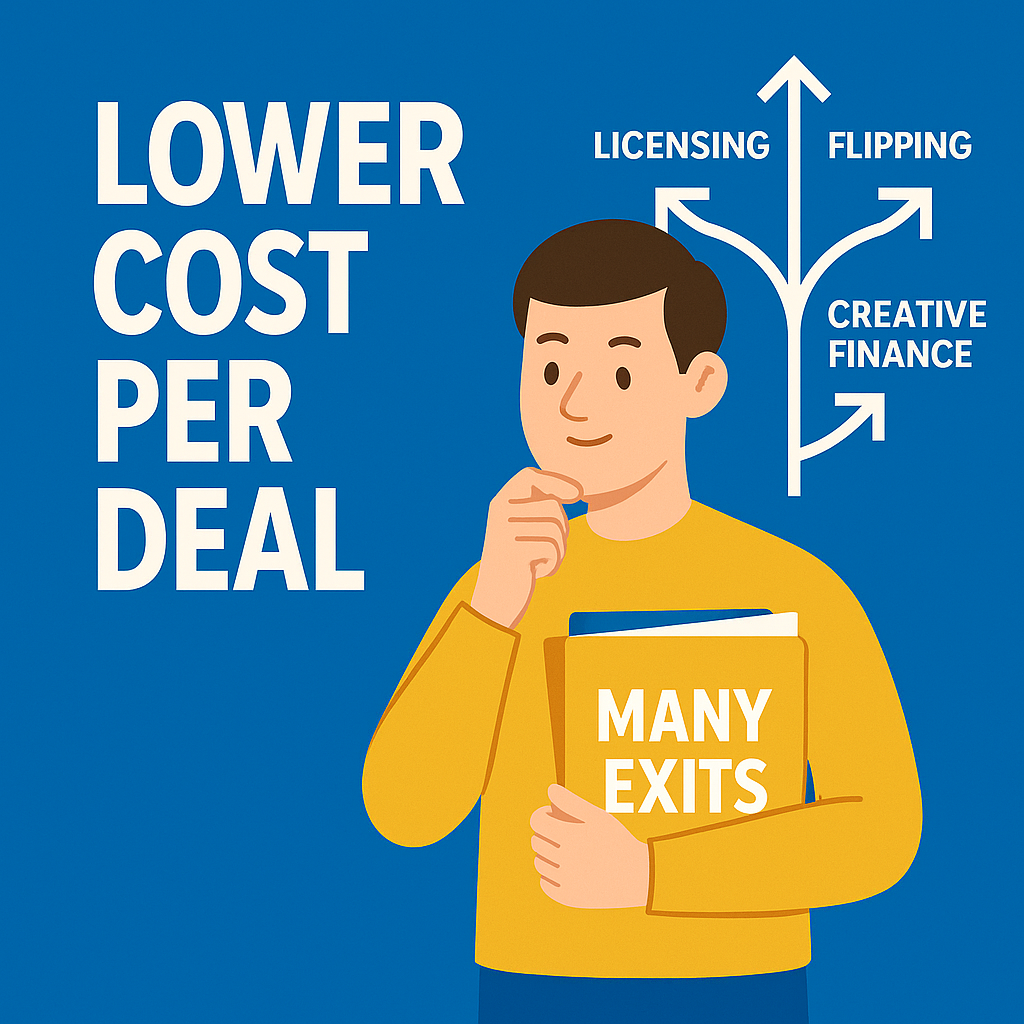The Path to Financial Freedom in Real Estate
For many, the idea of financial freedom seems like a distant dream. However, for those willing to shift their mindset and take action, real estate investing presents a clear path to building wealth. One of the most powerful ways to grow a successful real estate business is by generating motivated seller leads—finding sellers who are ready to make deals that benefit both parties. Tom Cafarella, a seasoned real estate investor and agent, has built a thriving business by combining the worlds of investing and agency work, creating a unique and profitable model for success.
From Medical School to Real Estate Success
Tom Cafarella’s journey into real estate wasn’t conventional. Originally on track for medical school, a single moment changed his trajectory. While delivering pizzas, he listened to Rich Dad Poor Dad and realized that true wealth wasn’t built by working long hours as a doctor—it was through investing and owning assets. This mindset shift led him to get his real estate license and, eventually, to his first major investing success: an assignment deal that earned him $115,000. From that point on, he knew that investing was far more lucrative than simply working as an agent.
That first big deal wasn’t just about the money—it was a complete realization that he had been on the wrong path. The experience shattered his belief that making money was complicated and showed him that wealth-building was actually simpler than he had imagined. He also realized that most people, including those around him, had no idea how money was actually made. This knowledge gap is what keeps many from ever achieving financial independence.
Over the years, Tom has flipped over 1,200 homes, built a 300-unit rental portfolio, and created a real estate business that merges agency work with investment strategies. His mission? To help real estate agents transition into investing, leveraging their existing skills to create long-term financial freedom.
The Real Estate Agent’s Dilemma: The Income Roller Coaster
Many real estate agents are drawn to the profession because of the promise of flexibility, financial freedom, and unlimited earning potential. However, most quickly find themselves trapped in a cycle of feast and famine—some months are profitable, while others leave them scrambling for commissions. The problem? Agents focus on transactions rather than building wealth.
Tom has seen this cycle play out with hundreds of agents in his brokerage of over 350 agents and in his Facebook group of more than 11,000 real estate professionals. His core message to them is clear: real estate agents are already doing the hardest part—talking to sellers. They just need to leverage those interactions better. Many agents, without realizing it, actually have less flexibility than W-2 employees because they are constantly at the beck and call of their clients.
Tom saw this issue firsthand and developed a model that helps agents think like investors. Instead of just working for commissions, agents should also be acquiring and holding assets. This approach not only stabilizes their income but also creates long-term financial security.
Why Every Real Estate Agent Should Think Like an Investor
Tom’s philosophy is simple: every real estate agent should also be an investor. Why? Because agents are already doing the hard part—talking to sellers. By offering both a traditional listing option and a cash offer for off-market deals, agents can open up more opportunities, generate additional income, and build a real estate portfolio.
The Benefits of This Model:
- Higher Lead Conversion – Sellers who may not list on the market could take a cash offer.
- More Ways to Make Money – Agents can earn commissions, flip properties, or build rental portfolios.
- Stronger Marketing ROI – The more ways you can monetize a lead, the more you can afford to spend on marketing.
- Faster Wealth Accumulation – Holding properties builds equity and long-term financial security.
By integrating investing into their business, agents position themselves to earn more from every motivated seller lead they encounter.
Tom has also found that many investors leave money on the table by not being licensed real estate agents. Investors who become agents can monetize leads they don’t buy, either by listing the property themselves or referring it to another agent for a commission. This hybrid approach is a game-changer for both agents and investors. Additionally, investors who become agents can save money when buying off the MLS and listing their flips.
The Power of Focus: Winning in Real Estate
One of the biggest challenges in real estate—whether as an investor or agent—is maintaining focus. Many entrepreneurs fall into the trap of chasing multiple opportunities at once, diluting their efforts. Tom emphasizes the importance of doubling down on what works. Just like elite athletes specialize in one sport to reach peak performance, real estate professionals should concentrate on their core strengths and build systems that support long-term growth.
Tom shares a compelling analogy from the founder of Priceline.com, who told a room full of entrepreneurs: "If you’re not here to talk about getting Priceline into more hotel chains, turn around." The message? Focus wins. Just like Olympic swimmer Michael Phelps didn’t waste time playing basketball or golf, real estate professionals shouldn’t spread themselves too thin. Tom himself struggled with staying focused early on, chasing multiple ideas instead of perfecting his winning formula.
The key? Stay disciplined and resist the urge to jump from one strategy to another. Instead, refine and scale what already generates results.
Active vs. Passive Income: The Long-Term Play
While flipping houses and assignments provide immediate cash flow, long-term wealth in real estate comes from owning assets. Tom’s biggest piece of advice? Hold on to more properties.
Time and time again, Tom sees investors regret selling properties that would have become cash-flowing assets. Every investor should aim to hold some properties, as long-term rentals provide financial security, equity growth, and freedom from the constant grind of chasing new deals. He reminds investors that 20 years from now, they won’t wish they had flipped one more house—they’ll wish they had kept more.
Key Takeaways
1. Mindset Shift Is the First Step to Wealth
Tom Cafarella’s journey began with a pivotal mindset shift after reading Rich Dad Poor Dad. He realized that building wealth comes from owning assets, not trading time for money.
2. Real Estate Agents Are Missing Out by Not Investing
Agents already do the hardest part—talking to sellers. By adopting an investor mindset, they can leverage their interactions to build wealth instead of relying solely on commissions.
3. Blending Agency Work with Investing Is a Winning Model
Tom built a successful business by combining real estate agency work with investing strategies, allowing agents to monetize more leads and earn from multiple income streams.
4. Feast-and-Famine Income Is a Major Agent Problem
Most agents face inconsistent income because they focus on transactions. Tom’s model helps stabilize earnings through property ownership and diversified income channels.
5. Offer Sellers Multiple Options
Agents should present both traditional listing services and cash offers to maximize conversions and open up more deal opportunities.
6. Investors Should Get Licensed
Unlicensed investors often leave money on the table. Becoming an agent allows them to monetize leads they don’t buy, list their own flips, and earn commissions.
7. Focus Is Key to Scaling
Tom emphasizes the importance of focusing on what works. Chasing too many strategies or opportunities leads to dilution and burnout. Specialization leads to growth.
8. Hold More Properties for Long-Term Wealth
While flipping provides quick cash, Tom encourages holding rentals for cash flow, equity growth, and long-term financial security.
9. Use Digital Marketing to Find Motivated Seller Leads
Generating high-quality leads is essential. Use online strategies, referrals, and networking to connect with motivated sellers ready for fast solutions.
10. Coaching Accelerates Growth
While free content is helpful, personalized coaching helps avoid mistakes, fine-tune strategies, and tailor investment plans to individual goals.
11. Build Systems and Stay Disciplined
To create sustainable success, real estate professionals must build repeatable systems and avoid the temptation to chase shiny new ideas.
12. Join Communities for Support and Learning
Tom runs the Agent Investor Podcast and a free Facebook group offering live trainings. These resources support ongoing education and connection within the investing community.
Action Steps: Build Your Real Estate Business Today
If you’re an agent, investor, or aspiring real estate entrepreneur, now is the time to take action. Follow these steps to accelerate your success:
- Shift Your Mindset – Start thinking like an investor, not just an agent.
- Generate Motivated Seller Leads – Use digital marketing, networking, and referrals to connect with sellers looking for quick solutions.
- Offer Multiple Solutions – Present both traditional listing options and cash offers.
- Hold More Properties – Don’t just flip—build your rental portfolio.
- Stay Focused – Avoid distractions and commit to your business model.
Additionally, Tom emphasizes the importance of investing in coaching. While free information is widely available, one-on-one coaching helps tailor strategies to individual situations, shortening the learning curve and avoiding costly mistakes. A coach can help determine the right investment path based on an individual’s financial situation and risk tolerance.
By integrating investing into your real estate career, you can create financial freedom, build wealth, and take control of your future. Start today—your success is waiting.
For more insights, you can listen to Tom’s podcast, Agent Investor Podcast, or join his free Agent Investor Facebook group, where he hosts live training sessions every Tuesday. He also offers paid coaching for those looking for personalized guidance in scaling their business.






